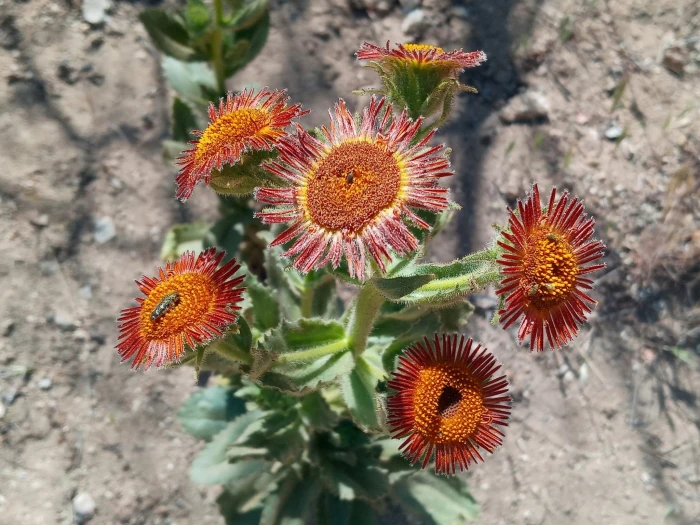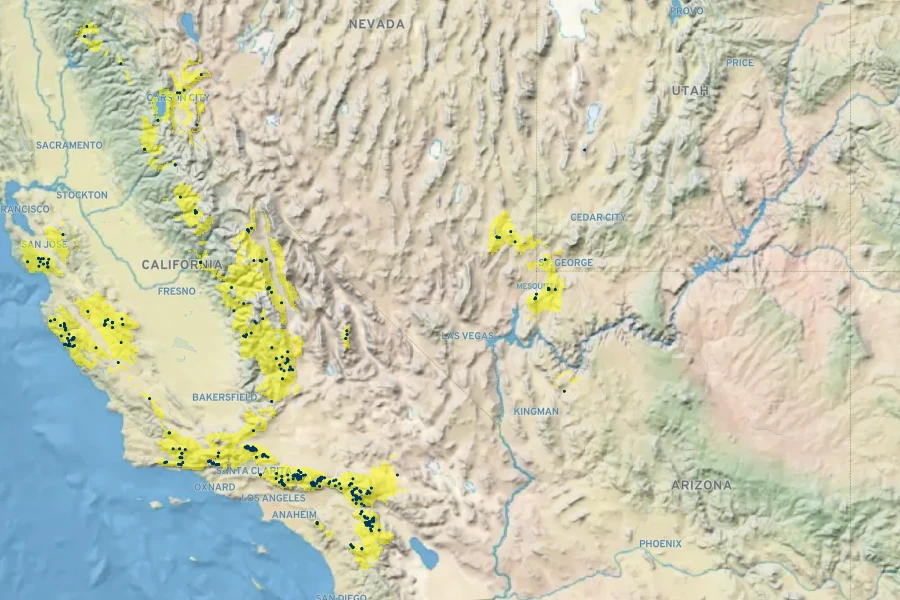Redray Alpinegold
/
(Hulsea heterochroma)
Redray Alpinegold (Hulsea heterochroma)
/

Daniel S.
CC BY 4.0
Image By:
Daniel S.
Recorded By:
Copyright:
CC BY 4.0
Copyright Notice:
Photo by: Daniel S. | License Type: CC BY 4.0 | License URL: http://creativecommons.org/licenses/by/4.0/ | Rights Holder: Daniel S. | Publisher: iNaturalist | Date Created: 2021-05-09T12:21:14-07:00 |

























Summary
Hulsea heterochroma, commonly known as Redray Alpinegold, is a herbaceous plant that can be either annual or perennial. It is native to montane and subalpine zones in the Southwestern United States, particularly in California, where it thrives in open habitats including chaparral, yellow pine forests, and mountain meadows. It is often found at elevations ranging from 3,000 to 9,000 feet. This plant typically reaches over 40 inches in height, with thick, leafy green stems. The leaves are 4 to 8 inches long, toothed, and covered in glandular hairs that can give them a sticky texture. Redray Alpinegold is notable for its vibrant flower heads, which feature yellow disc florets surrounded by red-orange to reddish-pink ray florets. These flowers bloom in the summer and are quite showy, attracting pollinators and adding color to high-elevation garden settings.
Redray Alpinegold is valued for its striking flowers, which can add a splash of color to rock gardens, wildflower meadows, and native plant landscapes. It is relatively low-maintenance, requiring well-drained soils and full sun to partial shade. While it is not commonly used in urban plantings, it is an excellent choice for naturalistic gardens and restoration projects. Due to its native high-elevation habitat, it is adapted to cooler temperatures and may not thrive in hot, lowland areas. Gardeners should be aware that it may require protection from excessive moisture and humidity. There are no widely known diseases or pests that significantly affect this plant, making it a resilient choice for suitable climates.CC BY-SA 4.0
Redray Alpinegold is valued for its striking flowers, which can add a splash of color to rock gardens, wildflower meadows, and native plant landscapes. It is relatively low-maintenance, requiring well-drained soils and full sun to partial shade. While it is not commonly used in urban plantings, it is an excellent choice for naturalistic gardens and restoration projects. Due to its native high-elevation habitat, it is adapted to cooler temperatures and may not thrive in hot, lowland areas. Gardeners should be aware that it may require protection from excessive moisture and humidity. There are no widely known diseases or pests that significantly affect this plant, making it a resilient choice for suitable climates.CC BY-SA 4.0
Plant Description
- Plant Type: Herb
- Height: 1-3 feet
- Width: <1-2 feet
- Growth Rate: Moderate
- Flower Color: Yellow
- Flowering Season: Spring, Summer
- Leaf Retention: Evergreen
Growth Requirements
- Sun: Full Sun
- Drainage: Fast
Common Uses
Low Maintenance, Rock Garden
Natural Habitat
Native to montane and subalpine zones in the Southwestern United States, particularly in California, thriving in open habitats including chaparral, yellow pine forests, and mountain meadows
Other Names
Common Names: Alpinegold, Sierra Hulsea, Redray Hulsea, Differentcolored Hulsea
Scientific Names: Hulsea heterochroma
GBIF Accepted Name: Hulsea heterochroma
